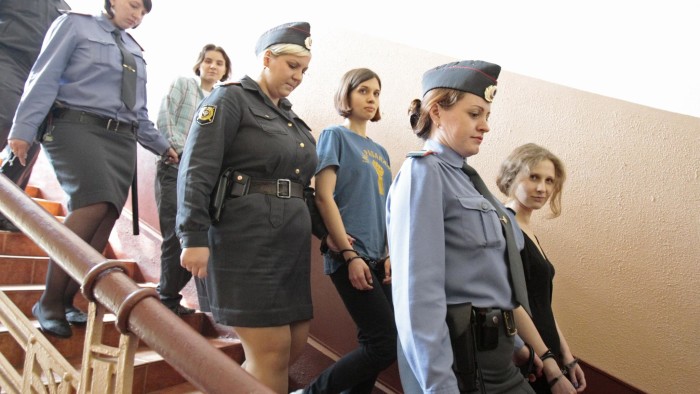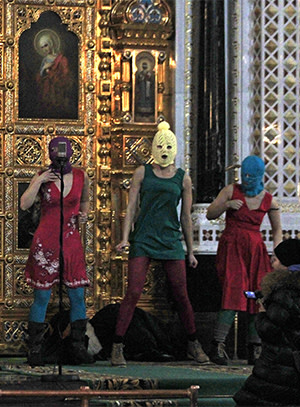‘Words Will Break Cement’, by Masha Gessen

Simply sign up to the Life & Arts myFT Digest -- delivered directly to your inbox.
Words Will Break Cement: The Passion of Pussy Riot, by Masha Gessen, Granta, RRP£9.99 / Riverhead, RRP$16, 320 pages
No question, they caused offence. Two years ago this month, the women of Pussy Riot took a central position before the altar in Moscow’s vast Cathedral of Christ the Saviour and, dancing in a way that would be described in court by a pious observer as “possessed”, half sang, half shouted out their latest composition.
This had a refrain, “shit, shit, holy shit!”, and called on the Virgin Mary to rid Russia of Vladimir Putin, then prime minister and about to be elected to serve a third term as president. The cathedral, a modern recreation of a 19th-century predecessor blown up on Stalin’s orders, was chosen because the group saw modern Orthodoxy as deeply compromised in its relations to state power; Kirill I, its leader, had described Putin’s rule as “a miracle from God” during the election campaign. Pussy Riot’s invocation of the Virgin was an attempt to rescue her femininity from a patriarchy both political and spiritual.
Their performance lasted two minutes and played to few people. The video, for which the event was staged, captures some middle-aged women looking on in horror; a nun spreads her hands before the lens to blot out the blasphemies; a security guard tries, ineffectually, to break it up.
Some of the group were briefly detained, then released. The show might have been forgotten had it not been designated as an attack on believers by the church: Archpriest Vsevolod Chaplin, its most prominent spokesman, wrote in a blog the day after the event that “we cannot and will not live in a society where such acts are possible”. Three of the women – Maria Alyokhina, Yekaterina Samutsevich and Nadezhda Tolokonnikova – were arrested, charged with “hooliganism motivated by religious hatred” and sentenced to two years’ imprisonment. Samutsevich was released on appeal in October 2012; the other two were sent to penal colonies from which they emerged, a little early, in December after a presidential amnesty.
In Words Will Break Cement, journalist Masha Gessen employs the same mix of reportage and advocacy that marked out her critical biography of Putin, The Man without a Face (2012). Gessen is herself a committed figure: Russian-born with a US upbringing, she lives with a female partner and is an ardent supporter of the embattled gay community. Last year, citing fears that her children might be taken from her, she returned to the US.
Alyokhina and Tolokonnikova are still in their mid-twenties, both with young children; Samutsevich, the more reserved of the three, is a little older. Coming of age under Putinism, all were bright, intellectually adventurous and attracted to a melange of diverse radical currents – Soviet dissidence, French situationism, even Christian asceticism – that their rulers and most of their fellow citizens instinctively find distasteful. Tolokonnikova enrolled in a philosophy course at Moscow State University, and wrote copiously; Alyokhina is a poet and musician who studied journalism; Samutsevich is a computer programmer who, ironically, worked for a time in her early twenties on software for a nuclear attack submarine.

These three central figures found in each other a common desire to make protest vivid. In flash appearances in streets, in luxury shops, on a plinth in Red Square, all videoed and put online, they began to gain fame among those who, from 2011 on, were taking to the streets to voice their own disgust at flawed elections and colossal theft from the state. It is well known that the Kremlin presides over an economy perilously dependent on high-priced oil and gas exports, with a demographic crisis and a disastrous male mortality rate; for Pussy Riot, however, Putin’s regime is above all one that oppresses the young, and wages war on gay people and on women.
If the group’s cultural critique touched a nerve in the Kremlin, it also represented an opportunity. Putin’s popularity may be slipping but the kind of opposition embodied by Pussy Riot is no more popular with Middle Russia than the US and western European radical movements of the 1960s were in their societies. The president’s narrative – of a strong, independent, anti-western Russia once again united with its church and reconciled to both its Soviet (minus a few black spots) and imperial pasts – resonates with millions for whom dissent has always been shameful and dangerous, and who see Pussy Riot as spoilt, incomprehensible and frightening.
Gessen puts the group’s court appearance at the centre of her account. She has little trouble in showing its farcical side, with a judge clearly primed to give prison sentences screaming in outrage at the three in their airless Plexiglas cube. The speeches the women gave when they were finally allowed to speak at the end of the hearing are potent testaments, rivalling the calm, devastating critiques that the oligarch Mikhail Khodorkovsky made at intervals in his 10-year sentence (he, too, benefited from Putin’s end-of-year amnesties). “We cannot abide,” Tolokonnikova told the court, “the forced civic passivity of the majority of the population.”
The two who served their sentences had a hard time of it: work days of up to 16 hours, arbitrary punishment, official encouragement of bullying and informing. Freed, they are stars, especially outside Russia: Madonna took them under her wing to introduce them at a concert in New York this week. For all the self-serving quality of her identification with those she calls “fellow freedom fighters”, the US singer has been constant in her expressions of support. But we should hope she doesn’t tempt Pussy Riot into finding a permanent niche among the beautiful people, for that way lies disillusionment for those in Russia who need them most – the young now seeking ways to make their society more pluralistic and tolerant. Gessen’s book is a fine, full, deeply sympathetic portrait of a particular kind of courage, a punk dissidence that is at once frail and mighty.
——————————————-
John Lloyd is an FT contributing editor
Comments